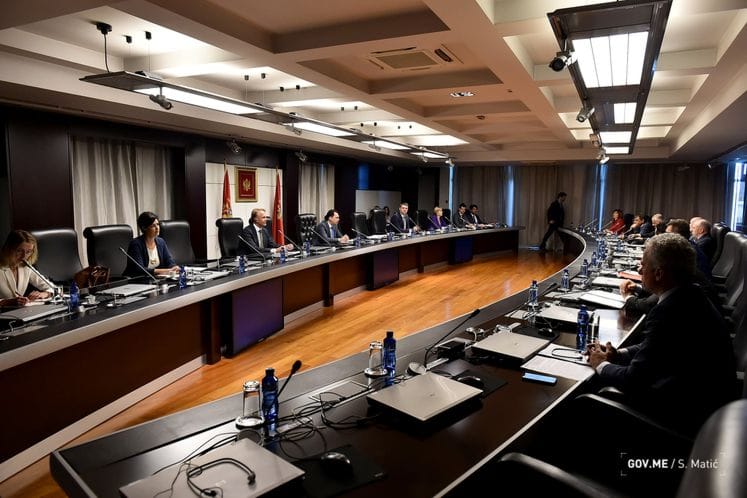- Government of Montenegro
DPM Pažin: I share stance of EC that in democratic...
Please note: The page below represents the archived content relating to the previous Government of Montenegro. Some of the information might be inaccurate or outdated.
Archive
DPM Pažin: I share stance of EC that in democratic society, concentration of power in courts through multiple mandates of court presidents is not acceptable

Published on: Jun 15, 2020 • 9:54 PM Author: PR Service
Podgorica, Montenegro (15 June 2020) -- Deputy Prime Minister Zoran Pažin made a public appeal, at today's session of the Rule of Law Council, to all court presidents who have held their positions for more than two mandates to, acting on their own conscience and respecting the stance of the European Commission, reconsider their determination to act as court presidents in this mandate too.
"The democratic capacity thereby expressed, would not call into question their existence, for the existing legal solution stipulates that after expiry of the term of office, the president of the court remains to work as a judge to the court, in which he was elected, thus guaranteeing professional and social security to all of them," said DPM Pažin at the session of the Rule of Law Council, which discussed the EC Informal Working Paper (Non-paper) on the state of play in the field of rule of law. Head of the EU Delegation to Montenegro Aivo Orav also attended the Council session, at the invitation of Deputy Prime Minister Pažin.
The Deputy Prime Minister emphasized that the Judicial and Prosecutorial Council should pay a special attention to those issues with regard to whom, the European Commission makes serious concerns such as personnel issues during the election of court presidents with multiple renewed mandates, as well as the issue of evaluating prosecutors, which resulted in the highest rating, with no exception for all evaluated state prosecutors, which, as he noted, cannot be considered a principled approach.
"I share the stance of the European Commission that, in a democratic society, a kind of concentration of power that is reflected in the repeated elections of court leaders is not acceptable, what I was pointed to, not only during the last election, but also five years ago, on the occasion of the previous election, when the European Commission has not yet opened it as a problem. I do not see this problem through the issue of constitutionality or legality, on which I have repeatedly voiced my legal point of view, but as the need for further democratic development of judicial institutions through personnel refreshment and avoidance of inertia, fatigue and other negative consequences, which may accompany the immutability of court presidents, the DPM pointed out.
Deputy Prime Minister Pažin expressed satisfaction that the European Commission has recognised further progress in the areas of rule of law that are under direct jurisdiction of the Government, particularly highlighting the successful results of the Police Directorate in combating all forms of crime in the country and beyond the borders of Montenegro in cooperation with partner police, especially in the areas of serious and organised crime, combating human trafficking and money laundering.
However, as the Deputy Prime Minister added, the Government does not enter the European Union, but the society as a whole, which is why the other two branches of government, as well as the Prosecutor's Office that is not defined to which branch of government it belongs, must bear responsibility for the European future of Montenegro.
Ambassador Orav welcomed the readiness and proactive approach of the Rule of Law Council to discuss the findings of the latest Informal Working Document of the European Commission on the state of play in chapters regarding the rule of law. He praised Montenegro's progress and renewed commitment in many key areas, including international police co-operation and the fight against human trafficking. However, the Head of the EU Delegation underlined that Montenegro should not undermine the results achieved in certain areas, for example, in judicial reform, and that must continue to achieve results in the fight against corruption and organised crime, while ensuring true independence of all relevant institutions, including the Agency for Prevention of Corruption and the public service.
Members of the Rule of Law Council, heads of state institutions in charge of the rule of law, undertook to inform the European Commission on the progress in fulfilling the given recommendations, before the adoption of the next annual progress report for Montenegro.
OFFICE OF THE DEPUTY PRIME MINISTER FOR POLITICAL SYSTEM, INTERIOR AND FOREIGN POLICY
PHOTO AND VIDEO: https://flic.kr/s/aHsmNQTws6
Related articles:
Parliament to decide on disposal of state property Mar 28, 2025
Press release from the Office of the Prime Minister Mar 28, 2025
Press release from the 74th Cabinet session Mar 27, 2025
Is this page useful?
